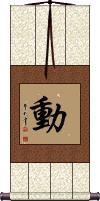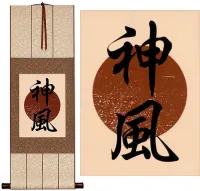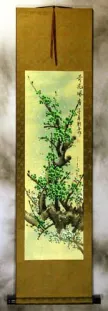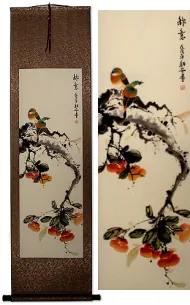Many custom options...
And formats...

Wind of Change in Chinese / Japanese...
Buy a Wind of Change calligraphy wall scroll here!
Personalize your custom “Wind of Change” project by clicking the button next to your favorite “Wind of Change” title below...
Wind of Change
風雲變幻 is a Chinese proverb that means “wind of change” or “changeable situation.”
The first character, 風, means wind, but when combined with the second character, 風雲, you have weather, winds and clouds, nature, or the elements. Colloquially, this can refer to an unstable situation or state of affairs.
The last two characters, 變幻, mean change or fluctuate.
Mujo no Kaze / Wind of Impermanence
無常の風 is an old Japanese proverb that means the wind of impermanence or the wind of change in Japanese.
This can refer to the force that ends life, like the wind scattering a flower's petals. Life is yet another impermanent existence that is fragile, blown out like a candle.
The first two characters mean uncertainty, transiency, impermanence, mutability, variable, and/or changeable.
In some Buddhist contexts, 無常 can be analogous to a spirit departing at death (with a suggestion of the impermanence of life).
The last two characters mean “of wind” or a possessive like “wind of...” but Japanese grammar will have the wind come last in the phrase.
Dynamic
Moving / Motion / Ever-Changing
動 is the only Chinese/Japanese/Korean word that can encompass the idea of “dynamic” into one character.
動 can also mean:
to use; to act; to move; to change; motion; stir.
In the Buddhist context, it means: Movement arises from the nature of wind which is the cause of motion.
The key point of this word is that it represents motion or always moving. Some might say “lively” or certainly the opposite of something that is stagnant or dead.
Note: In Japanese, this can also be a female given name, Yurugi.
This in-stock artwork might be what you are looking for, and ships right away...
Gallery Price: $72.00
Your Price: $39.88
Gallery Price: $200.00
Your Price: $122.88
Not the results for Wind of Change that you were looking for?
Below are some entries from our dictionary that may match your Wind of Change search...
| Characters If shown, 2nd row is Simp. Chinese |
Pronunciation Romanization |
Simple Dictionary Definition |
翻る see styles |
hirugaeru ひるがえる |
(v5r,vi) (1) to flutter (in the wind); to wave; to flap; to fly; (2) to turn over; to flip over; (3) to suddenly change (attitude, opinion, etc.); to suddenly switch; to alter; to flip |
飜る see styles |
hirugaeru ひるがえる |
(v5r,vi) (1) to flutter (in the wind); to wave; to flap; to fly; (2) to turn over; to flip over; (3) to suddenly change (attitude, opinion, etc.); to suddenly switch; to alter; to flip |
大風吹 see styles |
dà fēng chuī da4 feng1 chui1 ta feng ch`ui ta feng chui |
"The Wind Blows", a game in which one player calls out a category, all players who match it must change seats, and the person left without a seat becomes "it" (鬼[gui3]) |
十一切處 十一切处 see styles |
shí yī qiè chù shi2 yi1 qie4 chu4 shih i ch`ieh ch`u shih i chieh chu jū issai sho |
Ten universals, or modes of contemplating the universe from ten aspects, i.e. from the viewpoint of earth, water, fire, wind blue, yellow, red, white, space, or mind. For example, contemplated under the aspect of water, then the universe is regarded as in flux and change. Also called 十禪支, 十遍處定. It is one of the 三法. |
Variations: |
hirugaeru ひるがえる |
(v5r,vi) (1) to flutter (in the wind); to wave; to flap; to fly; (v5r,vi) (2) to turn over; to flip over; (v5r,vi) (3) to suddenly change (attitude, opinion, etc.); to suddenly switch; to alter; to flip |
Variations: |
hirugaesu ひるがえす |
(transitive verb) (1) to turn over; (transitive verb) (2) to change (one's mind); to reverse (one's decision); to take back (one's words); to retract (one's testimony, confession, etc.); (transitive verb) (3) to fly (a flag); to let (a skirt, cape, etc.) flap in the wind; to let flutter |
Variations: |
hirugaeru ひるがえる |
(v5r,vi) (1) to flutter (in the wind); to wave; to flap; to fly; (v5r,vi) (2) to turn over; to flip over; (v5r,vi) (3) to suddenly change (attitude, opinion, etc.); to suddenly switch; to alter; to flip |
The following table may be helpful for those studying Chinese or Japanese...
| Title | Characters | Romaji (Romanized Japanese) | Various forms of Romanized Chinese | |
| Wind of Change | 風雲變幻 风云变幻 | fēng yún biàn huàn feng1 yun2 bian4 huan4 feng yun bian huan fengyunbianhuan | feng yün pien huan fengyünpienhuan |
|
| Mujo no Kaze Wind of Impermanence | 無常の風 | mu jou no kaze mujounokaze mu jo no kaze | ||
| Dynamic | 動 动 | dou / do | dòng / dong4 / dong | tung |
| In some entries above you will see that characters have different versions above and below a line. In these cases, the characters above the line are Traditional Chinese, while the ones below are Simplified Chinese. | ||||
Successful Chinese Character and Japanese Kanji calligraphy searches within the last few hours...










